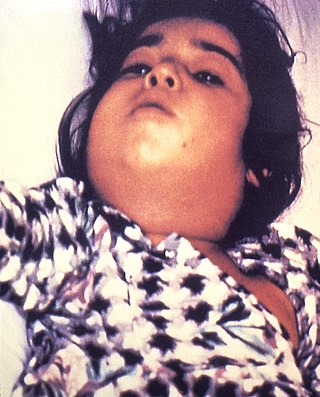Diphtheria
infectious disease From Wikipedia, the free encyclopedia
Remove ads
Diphtheria (pronounced "diff-THEER-ee-uh") is an infectious disease caused by a bacterium called Corynebacterium diphtheriae. It can be treated by special drugs, or by antibiotics. There is a vaccine which can prevent diphtheria. In 1942, there were 50,804 diphtheria cases in England and Wales; now there is about one case a year.[1]

Diphtheria can cause serious problems, like:
- Inflammation of the heart, which can lead to death
- Different forms of paralysis, by poisoning of nerve cells
- Pneumonia
- Encephalitis
- Problems with the kidneys
Remove ads
Signs and symptoms
Signs and symptoms of diphtheria usually begin two to five days after a person gets infected. They may include:
- A thick, gray membrane covering the throat and tonsils
- A sore throat and a hoarse voice
- Swollen glands (enlarged lymph nodes) in the neck
- Trouble breathing, or fast breathing
- Nasal discharge
- Fever and chills
- Malaise
In some people, infection with diphtheria-causing bacteria causes only a mild illness. These people may have no obvious signs or symptoms. Infected people who do not know they have diphtheria are called carriers of diphtheria, because they can spread the infection without being sick themselves.
Remove ads
Cutaneous diphtheria
A second type of diphtheria can affect the skin. This type of diphtheria is called cutaneous diphtheria. It causes pain, redness, and swelling on the skin, like other bacterial skin infections. People with cutaneous diphtheria may get ulcers, covered by a gray membrane, on their skin.
Cutaneous diphtheria is more common in tropical climates. However, cutaneous diphtheria also happens in the United States, especially among people with poor hygiene who live in crowded conditions.
Remove ads
Mechanism
Diphtheria toxin is produced by C. diphtheriae only when infected with a bacteriophage which integrates the toxin-encoding genetic elements into the bacteria.[2][3]
References
Wikiwand - on
Seamless Wikipedia browsing. On steroids.
Remove ads
